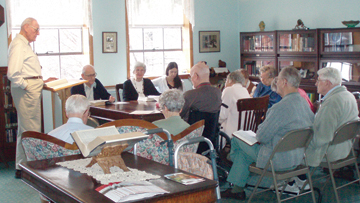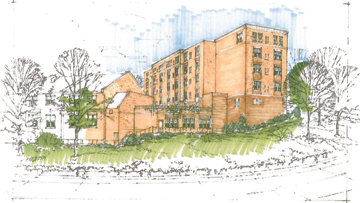You have free articles remaining this month.
Subscribe to the RP Witness for full access to new articles and the complete archives.
T hroughout the Bible, God calls His people to remember that He acts in history and knows the end from the beginning. We can exclaim with the psalmist, “Come and see what God has done, how awesome his works in man’s behalf!” (Ps. 66:5).
This summer, the Reformed Presbyterian Woman’s Association (RPWA) celebrates 110 years of continuous service to the aged. And, in the fall, its ministry will expand with the opening of the Upper Rooms, where elderly people will live independently in apartments with supportive services available from the adjoining Reformed Presbyterian Home.
The vision for the Home was planted in 1890 when a woman in the Wilkinsburg, Pa., RPC lost her hand and was no longer able to support herself. Learning of her plight, the women in the congregation took action, petitioning Synod to consider “the necessity of taking steps to provide a Home for Aged Persons and an Orphanage if found practicable.” John A. McKee, at the request of his daughter, Mary McKee Morton, left $5,000 from his estate to Synod to begin this ministry. The Synod of 1897 passed a resolution giving responsibility for managing the Home to the women of the church under the corporate name of the Reformed Presbyterian Woman’s Association (RPWA).
The Home opened that summer on a hilltop in what was then the rural City of Allegheny, which is now incorporated into the City of Pittsburgh. Residents and board members alike had to pitch in as able—caring for the cows and chickens, washing dishes, mending clothes, doing laundry, and caring for the sick. Board members purchased furnishings and equipment and maintained the building and grounds. The only employees were a matron and a cook.
Since that time, many changes have taken place: a move to the Home’s present location on Perrysville Avenue in 1903; building expansions in 1907, 1957, and 1983; increasing government welfare and regulations; urbanization; and socio-economic decline in the surrounding community. Today the Home is fully accredited by the appropriate regulatory agencies and employs a staff of 120, onethird of whom live within a one-mile radius of the Home. The facility includes a 57-bed skilled and intermediate nursing facility and 28 private rooms in the residential (assisted living) unit.
All the while, the Home has maintained its commitment to a high standard of physical and spiritual care for the residents in an atmosphere of Christian love. Although much of the culture has shifted to a quality-of-life ethic, the RPWA maintains its strong belief in the sanctity of life—that God has given value to each person’s life that does not diminish with age or with changes in mental and physical condition. Each resident has varying levels of health, activity, intellect, creativity, sociability, and independence. The goal is to provide an environment that will help each person achieve his or her maximum level of physical, spiritual, mental, and social well-being. By providing different levels of care, the Home strives to meet the needs of residents in a supportive rather than a restrictive environment.
In keeping with its charitable mission, the Home sets its charges at cost. When appropriate, the Home provides benevolent care. Donations, grants, bequests, and endowment funds help offset this charitable care and are vital to the ministry.
Recent improvements at the Home include the conversion from shared to private baths in the residential unit, the installation of an upgraded sprinkler system throughout the building, a remodeling of the dining rooms, the purchase of a van with a wheelchair lift, and a new and larger bus to accommodate more residents for shopping trips and social excursions. In addition, the RPWA has plans to refurbish patient rooms in the nursing unit.
The Upper Rooms, scheduled for occupancy this fall, will complete the RPWA’s goal of providing a continuum of care, enabling older adults to age in one place, without having to experience multiple moves. For some, it may prevent or delay the need to enter personal care or even nursing care. One- and two-bedroom and studio apartments will have fully-equipped kitchens, baths, living, and dining space. Residents will maintain their privacy and independence.
Independence is best achieved through access to services. All residents will enjoy the services normally associated with a well-run apartment building—maintenance, trash disposal, grounds keeping, and security. Each unit will include individually controlled heating and air conditioning. Outside, residents will have use of a courtyard, garden plots, and walkways. Many of the apartments will feature spectacular views toward the Ohio valley.
Residents may purchase transportation, housekeeping, laundry services, and meal plans in the Home dining room or cafeteria, or they may prepare meals in their apartment. The connector between Upper Rooms and the Home, with a “Main Street” theme, will have amenities like a beauty parlor and barber shop, cafeteria, and convenience store. Residents also may be seen by one of the physicians who regularly visit the Home. Emergency call buttons will be located in each apartment.
Upper Rooms residents will be invited to participate in all of the Home’s activities, including worship and prayer meetings, crafts, movies, picnics, holiday celebrations, game nights, and trips. They will also have access to the Home’s wellstocked library. Residents will be able to enjoy visits from preschool-age children attending Robin’s Nest, a daycare center operated by the RPWA across the street from the Home.
The idea for the Upper Rooms began in 2003 when the Pittsburgh representative of the White House Office on Faith-Based and Community Initiatives met with RPWA representatives and encouraged the expansion of its ministry to reach more low-income older adults by providing affordable housing. With the government’s assurance that the integrity of the RPWA’s mission would be maintained, the Association applied for and received a Department of Housing and Urban Development (HUD) Section 202 capital grant of $3,030,700 for construction of 26 apartments for lowincome, frail elderly persons. Applicants for these apartments must be at least 62 years old and have an annual income of $20,250 or less.
In addition, the RPWA is incorporating 9 market-rate apartments, called the Vista, in the same structure, thereby reducing development and construction costs. There are no income restrictions for the Vista.
The need for affordable housing for the elderly is great. Over the next 30 years, the U.S. population over the age of 65 is predicted to double, and there will be fewer younger adults to provide them with care.
The City of Pittsburgh and the Perry Hilltop community have embraced the Upper Rooms project with enthusiasm. The Home has been a good neighbor and a stable employer for over a century, and Upper Rooms will enhance the impoverished census tract, which had a median household income of $25,217 in 1999. Where the householder was over 75, the annual income was $14,972—an inadequate amount to pay for personal care outside a nursing home.
Commenting on the Upper Rooms project, Dennis Davin, director of the Department of Housing for the Urban Redevelopment Authority of Pittsburgh, stated, “The provision of elderly housing plus supportive services is a critical part of the city’s overall housing strategy.”
The Perry Hilltop Citizens’ Council wrote: “There are many low income older persons living in our community. Many of them need to be in better circumstances. Too many of them live alone without younger family members to help them find transportation to doctors’ appointments and take them shopping. The Perry Hilltop Citizens Council is interested in improving the quality of life for everyone in our community. We believe that this project will be a big step in that direction for the low income senior citizens in our neighborhood.”
From the Home’s humble beginning in 1897, God has blessed its ministry, providing the resources to serve thousands of retired pastors and their wives, missionaries, and other elderly servants of Christ, both from RP congregations and churches in the community. With the opening of Upper Rooms in the near future, the RPWA looks forward to an expansion of its ministry, meeting the physical and spiritual needs of older adults who are able to live independently with supportive services available.
“My people will live in peaceful dwelling places, in secure homes, in undisturbed places of rest” (Isa. 32:18).

